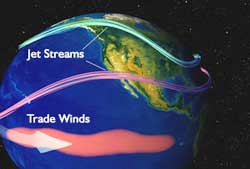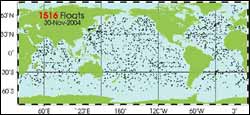
Scientists studied the winds and rains in the eastern Indian Ocean for hints at developing El Ninos. They used that information to create an “Index” or gauge that accurately predicted the El Nino of 2002-2003.
El Nino is signaled by a warming of the ocean surface off the western coast of South America that occurs every 4 to 12 years when cold, nutrient-rich water does not come up from the ocean bottom. It causes die-offs of plankton and fish and affects Pacific jet stream winds,

International network reaches 1,500th float deployment-halfway to full array
Note: This news release is issued in conjunction with the Group on Earth Observations (GEO-5) and the Partnership for Observation of the Global Oceans (POGO-6) international meetings held the week of Nov. 29, 2004.
Scientists have crossed an important threshold in an international effort to deploy a global network of robotic instruments to monitor and investigate important changes in the world’s oc
The December issue of GEOLOGY covers a wide variety of potentially newsworthy subjects. Topics include: impact of shifts in the North Atlantic current on European climate; new method for estimating elevations of Earth’s ancient land surfaces; evidence of terrestrial causes of the Permian-Triassic mass extinction; evidence of a major Precambrian asteroid impact in northwestern Australia; the relationship of intensified hydrologic cycles and global heat transfer during greenhouse phases of E
As millions of holidaymakers will testify, the Mediterranean is uniquely clear – and blue – unlike the cloudy grey of many coastal waters. But how many of its grateful bathers realise that the Med is so crystal clear because it’s the ocean equivalent of the Sahara desert?
A Leeds-led team of international scientists studying the fragile marine ecosystem of the Eastern Mediterranean has found that the reason the waters are so transparent is an acute shortage of phosphates – vital el
Two hundred and fifty million years ago, ninety percent of marine species disappeared and life on land suffered greatly during the world’s largest mass extinction. The cause of this great dying has baffled scientists for decades, and recent speculations invoke asteroid impacts as a kill mechanism. Yet a new study published in the December issue of Geology provides strong indications that the extinction cause did not come from the heavens but from Earth itself.
An intern
If you run into Ed Saff at a cocktail party and ask him what he does for a living, the mathematician is likely to reply that he is working on a “method for creating the perfect poppy-seed bagel.” Then he’ll pause and add, “Maybe that’s not the most accurate description, but it’s the most digestible.”
More accurately, Saff, who is a mathematics professor at Vanderbilt, has been working with his colleague Associate Professor of Mathematics Doug Hardin to come up with a new and improv